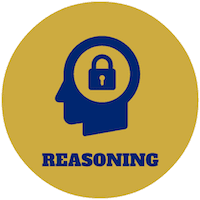Smart thinking
What professionals tell about smart thinking
‘Smart Thinking’ simply means: do more, better. It is the ability to solve new problems using one’s current knowledge, and the good news is that it is a skill that one can develop.
Strategies used in smart thinking
- Asking questions: You can learn more, challenge theories, and identify hidden biases by asking open-ended questions.
- Analyzing and evaluating information involves looking at the data, spotting trends, and determining the reliability of the sources.
- Making use of logic and reasoning: You can use logic and reasoning to assess arguments and reach judgments, which can assist you in making wise decisions.
- Being open-minded can help you broaden your thinking and take into account alternative solutions. Being open to new ideas, perspectives, and feedback can help you do this.
- Taking into account a variety of viewpoints: Doing so will enable you to make more informed decisions that are well-rounded.
What is reasoning
Critical thinking uses logical and rational thinking to analyze information and make decisions. It involves evaluating arguments and evidence to determine their strength and validity. Different types of reasoning can be used, such as deductive, inductive, and abductive. Effective critical thinking involves being objective, identifying assumptions, and recognizing biases and fallacies. It helps to identify problems and generate solutions based on sound logic.
- Deductive reasoning: Deductive reasoning is a type of logical thinking that starts with a general statement or premise and applies it to a specific situation or conclusion. In this type of reasoning, if the premises are true, the conclusion must also be true. For example, if we know that all dogs are mammals, and we also know that Fido is a dog, then we can logically deduce that Fido is also a mammal. Deductive reasoning involves making specific conclusions based on general principles, which allows us to reach a logical and valid conclusion.
- Inductive reasoning: is a way of thinking that uses examples or observations to make conclusions. We gather information, look for patterns, and use those patterns to draw conclusions. For example, if we only see birds that can fly, we may think that all birds can fly. However, this might not be true for every bird. Inductive reasoning helps us make good guesses based on what we know, but we must remember that these guesses might not always be correct.
- Abductive reasoning: Abductive reasoning is a technique for developing an educated guess or hypothesis using scant information and insufficient evidence. When we don't have all the necessary information, it is frequently used in decision-making or problem-solving. Even though it might not be entirely accurate, we can develop the most likely explanation or hypothesis by considering the available evidence. For instance, wet footprints on the floor might lead us to believe that someone recently stepped in water. Despite the fact that abductive reasoning aids in our ability to make educated guesses based on the information at hand, we must remember that these assumptions may not always be accurate.
Engaging in arguments can have several benefits. By presenting and defending our ideas, we can:
- Strengthen our critical thinking skills: Constructing and evaluating arguments can help us improve our reasoning abilities and make more informed decisions.
- Broaden our perspective: Through arguments, we can gain a better understanding of other people's perspectives, opinions, and experiences. This can help us become more open-minded and empathetic.
- Refine our communication skills: In order to effectively present our ideas and respond to counterarguments, we must develop our communication and persuasion skills.
- Resolve conflicts: By discussing and debating issues in a respectful and constructive manner, we can find common ground and reach solutions to problems.
Overall, arguments can provide us with an opportunity to learn, grow, and make progress toward
shared goals.
shared goals.
What is an explanation
An explanation is a statement or description that provides clarification, reasoning, or justification for a particular idea, event, or phenomenon. It aims to make something clearer or easier to understand by providing details, examples, or evidence to support a claim or answer a question. Explanations can be provided in various forms such as verbal, written, or visual, and they can be simple or complex depending on the subject matter. An effective explanation should be clear, concise, and relevant to the audience and their level of understanding.
Difference between argument vs explanation
An argument is a statement or set of statements that aim to persuade someone of a particular point of view or convince them to take a particular action. It involves presenting evidence and reasons to support a claim and is often used to try to win a debate or prove a point. An argument may involve counterarguments and can be seen as an attempt to prove something to be true.
On the other hand, an explanation aims to clarify or provide understanding about a particular idea, event, or phenomenon. It involves providing information, details, and reasoning to make something clearer or easier to understand. Unlike an argument, an explanation does not aim to convince someone of a particular point of view but rather to provide a deeper understanding of a subject.




Comments
Post a Comment